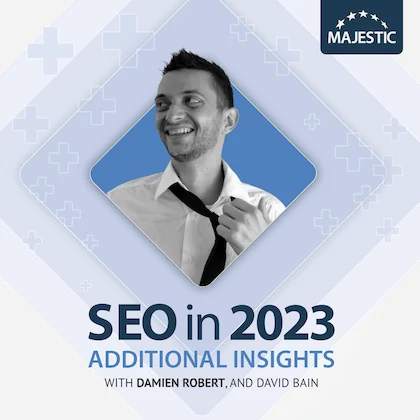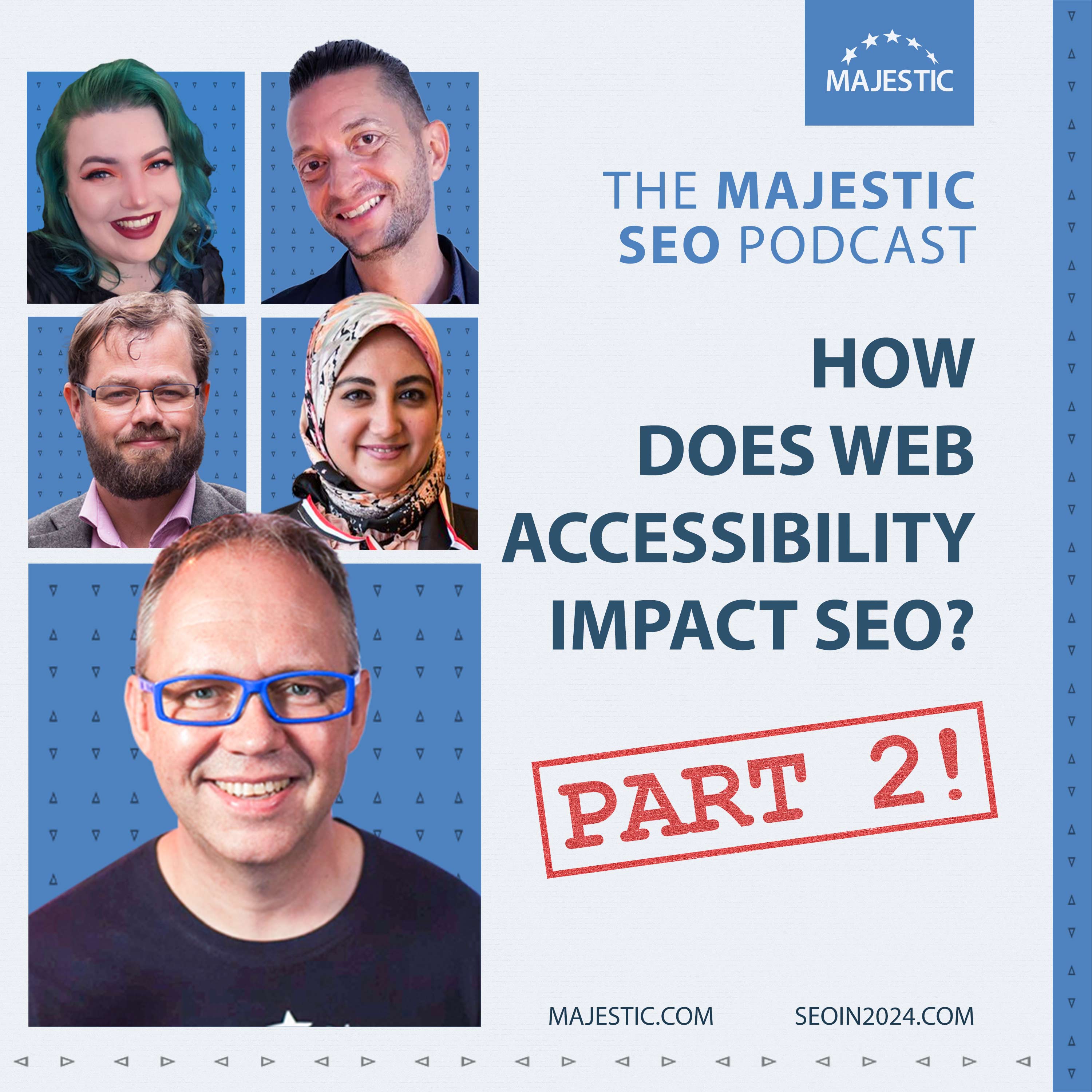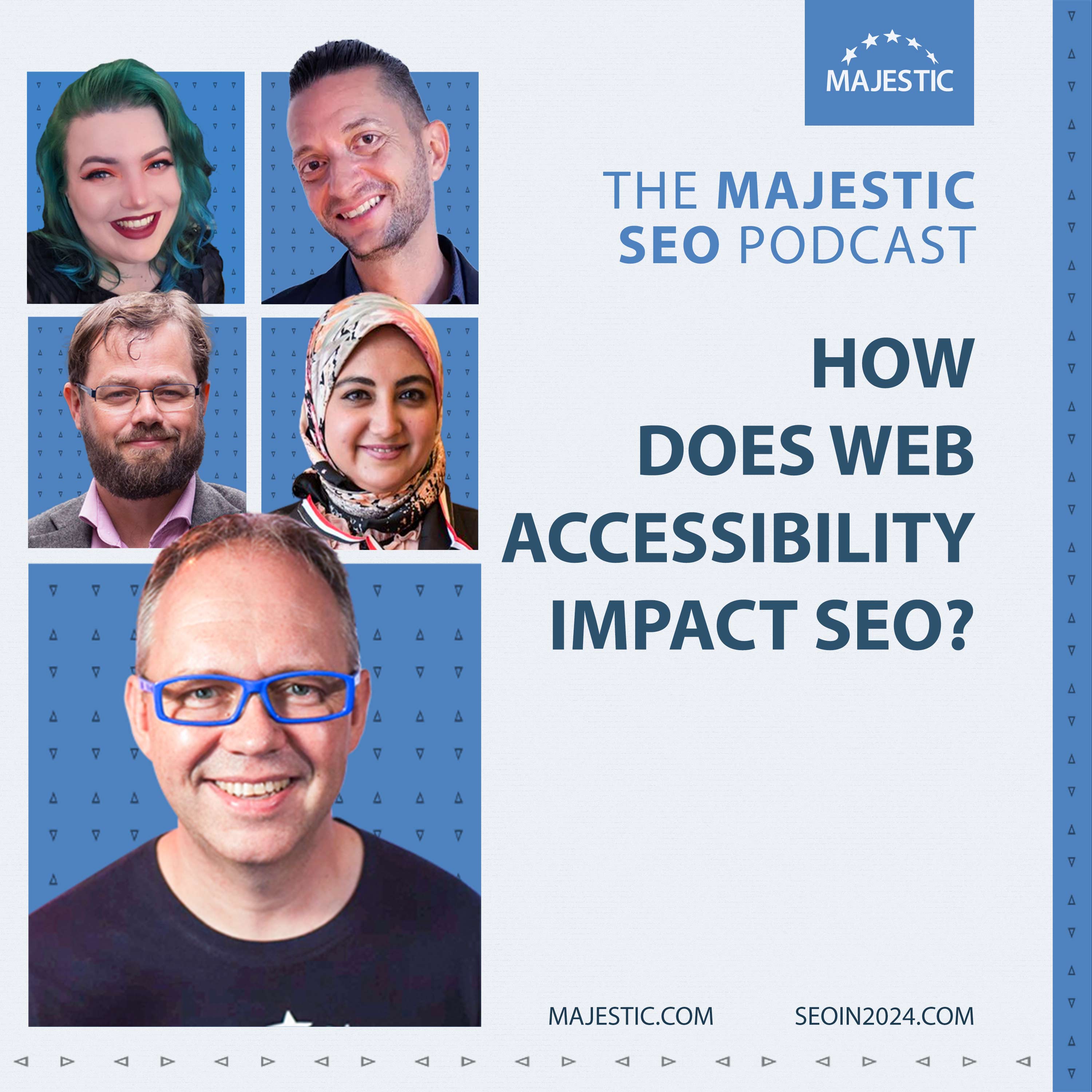-
Site Explorer
- Majestic
- Summary
- Ref Domains
- Backlinks
 New
New Lost
Lost- Context
- Anchor Text
- Pages
- Topics
- Link Graph
- Related Sites
- Advanced Tools
- Author ExplorerBeta
- Summary
- Similar Profiles
- Profile Backlinks
- Attributions
- Compare
-
Link Tools
- My Majestic
- Recent Activity
- Reports
- Campaigns
- Verified Domains
- OpenApps
- API Keys
- Keywords
- Keyword Generator
- Keyword Checker
- Search Explorer
- Link Tools
- Bulk Backlinks
- Neighbourhood Checker
- Submit URLs
- Experimental
- Index Merger
- Link Profile Fight
- Mutual Links
- Solo Links
- PDF Report
- Typo Domain
- Free SEO Tools
- Support
Stop creating new websites and delve into the power of domain consolidation
Damien Robert
Damien Robert advocates for the power of domain consolidation, an approach that not only supercharges SEO, but also provides extensive benefits in sustainability, search generative experience readiness, data and branding.

Damien Robert says: “Consolidate your domain, streamline your web presence, stop building new websites and new subdomains and just relax and enjoy all the benefits from it. There’s probably more benefit than you can even think of, either for yourself or your brand or for your client.”
Okay, I'll quickly go into a related question because you were talking about subdomains, is having a blog on a subdomain a good idea or bad idea?
“Well I would say it’s a bad idea because my tip is about consolidation, so having a sub directory instead will let you benefit from the perceived ‘domain authority’ of your main domain. So I would say that if you have to choose, always go for the sub directory.”
So it's an easy choice to make when you're making it for the first time, but if you're faced as an SEO going into a business, and the blog is on a subdomain already, and it's got some authority and traffic that's being driven to that subdomain, is that still the right decision to move the subdomain to the folder?
“Yeah, I would think so, because again, it’s actually not about migration, but consolidation of the domain. So it could be even easier than you think to consolidate both, and it can be completely seamless and transparent for the users. If you consolidate the subdomain into the domain, and you apply direction the right way, it's a little bit of work, of course, but at the end of the day, you will see the direct benefits in about three months.”
So I've worked with brand teams and with digital PR teams in the past, and they've come up with different distinct campaigns and they've maybe bought an individual domain specifically for that campaign, and perhaps then forwarded that domain to a subdomain. Sometimes you have CMSs that make it more challenging to have access to the core domain. Is it worth the hassle to build those sorts of campaigns on your core domain on a folder? Or is it reasonable to run those campaigns on a separate domain or in a folder, and then once they're finished, 301 redirect them to maybe a folder on your main domain?
“So in terms of building, it could be a good idea to use a subdomain, but before publishing, I would really not advise to publish a subdomain and after to have to consolidate it because it doubles the amount of work. I understand why people do that because most of the time it’s the easier option to not go through the hassle to ask permission on the main website, which could be really well controlled, and have lots of governance. For an agency, for example, to create a new campaign I will always advise to create a subdomain or a new website, because it's easier for them. But what's easier for people is not necessarily the most performant, and definitely not the most sustainable when you think of it. So I think you have to ask yourself all these questions before going for the easy way and the easy solution, because thinking it’s going to be good enough is sometimes not the path to take.”
So as an SEO, if you're encountering another ‘niche marketing departments’, if you want to call it that, and they want to create a new subdomain for their individual campaign, how do you say no? How do you argue against that to hopefully persuade them not to do that?
“Firstly I’d show them the results of domain consolidation on the main domain and show how it could benefit them to come to the main domain, because talking about Web Governance or anything like that, could completely deter people sometimes, especially when they want some things strongly enough to find arguments to go against it. So you need to show the benefits, you need to show why sustainability is good for the main domain, etc. There are more benefits than I can think of going on the main domain, not only for the performance of the campaign or whatever they want to publish as content or as tools, but from lots of different reasons. And one of those reasons could be the readiness for generative AI, the current buzzword.”
One of the words that you used was sustainability when you're talking about the benefits of not using subdomains, so what do you mean by sustainability in this context?
“I mean the digital carbon footprint and digital sustainability. It's really rare nowadays to work in a company where there is not a sustainability program in place, or any ESG department or anything like that. The first argument is actually streamlining websites, which means streamlining resources, streamlining cost, streamlining customer experience and customer journeys. So it all goes completely towards sustainability and to digital sustainability. It's a great argument that talks to lots of people nowadays.”
I love your argument of streamlining the UX because I think we've all been in websites where you've clicked on a standard menu link from the top-nav, and then you've gone on to a completely different look and feel and you're half wondering, is this the same business, or have I clicked onto another website?
“That’s happened to me lots of times and brand consistency is one of the benefits of doing consolidation, and it will really help your brand reputation. I loved your description there, because that's my feeling all the time. It’s what I say when I present domain consolidation at conferences, because everybody loves to know which ‘house’ they are. Tell me who doesn't like knowing where they are when navigating a website, because nobody likes complex brand architecture, apart from maybe the brand team. Really making sure that the user knows where they are is definitely another benefit for brand consistency and design.”
You also mentioned the importance of the readiness for generative AI. So how does domain consolidation help with that?
“Well it’s though through authority, or let's say, perceived domain authority. When I say perceived domain authority, I mean the generic understanding of the authority of a domain, rather than in the metric sense. Increasing link equity on a website by consolidating all the websites will naturally increase the perceived domain authority and generative AI and large language models are using sources, aren’t they, so you want to be seen as an authoritative source.
I think it was Britney Muller who said LLMs are not deterministic and they are just generating randomized outputs, and this is so true. People forget that all the time, and they say they're scared of AI and generative AI, and they think that ChatGPT is AI and the thing that is going to change everything. Maybe it will change. People are going to use large language models, so let’s be ready for them. Let's increase the authority of our content and our domain, because we want to be the source of selection from generative AI. I think that domain consolidation will increase the chances to be ready for the next search engine landscape.”
It's a great point, because you need to be teaching AI that you are the authority in your particular industry and your subject matter. Maybe 10 years ago or so when there was more of an argument or debate about whether or not to use folders or subdomains, a few people were saying Well, Google is more intelligent now, so as long as you've got a decent menu structure there with your subdomains in there and you're demonstrating to them, that it's part of the same website, that it shouldn't be an issue at all.
However, AI is potentially another crawler or another search engine for the future, and they might not be as progressive as Google in terms of understanding the differences between different subdomains in your core website. So make it easy for newer search engines and to understand that your site all relates to one another in terms of categories, and you're making it more challenging by using folders or by using subdomains.
“Yeah, exactly, you should be one source of information, and I agree with you that Google had the better understanding of this kind of architecture. But that's a good point that I would like to actually bounce back on, that when people decided to create all of these ccTLD domains, like yourwebsite.fr, or yourwebsite.de, we thought that it was a great solution, to have not only one proof, but many proofs that's a consolidated domain, consolidated with all the ccTLD domains, on to the unique.com will allow you to actually implement a good hreflang tagging. And a good hreflang tagging on one is working better than several ccTLD domains in terms of geo-targeting your audience and your organic traffic.
I have the proof, and I was even surprised myself that it was working so much better, and that we were getting actually so much more geo-targeting organic traffic on our unique website with a great hreflang tag matrix than in several market sides.
So even for Google, I would say domain consolidation is the way forward. And of course for generative AI, too, because we don't know how they select the sources now, but what we do know is that they will select the sources that looks authoritative and has a high perceived domain authority.”
So if you're a business that operates in different countries, and at the moment, you've got a unique domain for each country, you've got the country specific domain name, although you can set that up in hreflang, it’s something that AI might not necessarily be considering, so you're saying, move to the .com version of your site and use folders to differentiate your countries and languages?
“Completely, let’s go back to that. It's something that all companies used to do, then they switched to subdomains, and after they switched to ccTLD domains. I would say to go back to one domain, it’s sustainable in many ways, for many reasons, and this is working well. I think it wouldn't really spoil generative AI because they're really good in switching languages. As a bilingual. I've tested that a lot, when asking a question, I switch to French, and then English and back to French again, and they're very good in actually collecting the correct language.
We're not really that bothered about the territory or geo-targeting in generative AI for now, but that's a good question. I think that well implemented hreflang tagging, and automated, then why not? If you can use a more intelligent CMS or plugins it’s the way forwards and is working very well. And this is super easy for your crawl and for auditing the website and had lots of advantages.”
What are the advantages with having a unique top level domain for each country? If you're a journalist talking about a website or talking about a business, then you want to link to its homepage. You don't want to link to /fr, /this, /that in order to provide the content to your users. You might be talking about the website as a resource in a written publication. So is a country specific top level domain is better for them?
“So you could automatically geo-target your homepage, but only your homepage, so you don’t risk any spider traps or anything that we've seen in the SEO world before. But if you geo-target your homepage, then the journalists, wherever they are from, can go to your website, and if you are in France, you will automatically go to your website.com/fr.”
Okay, so essentially, 301 redirect based on IP recognition?
“Yes. If you come from the legacy of having different ccTLD domains, so yourwebsite.fr, yourwebsite.de, you will still keep them because of course you want to redirect the legacy domain to the.com. So you can still use the domain and it will automatically go to your website.com/fr, with a redirection and change of DNS, and depending on how you perform domain consolidation, because there is not only one methodology to do it.”
So you’ve shared what SEOs should be doing in 2023, now let's talk about what they shouldn't be doing. So what's something that's seductive in terms of time, but ultimately counterproductive, what's something that SEOs shouldn't be doing in 2023?
“I think these days it’s spending too much time being scared of the future, and therefore spending lots of time reading information about LLMs (Large Language Models) or AI in general, and forgetting to actually invest your time in what can be can be sustainable or what can never change in time of uncertainty. Domain consolidation is an example, but you can do lots of things that you are actually 100% sure that will work tomorrow, rather than getting frozen by the threads of a changing landscape.”
Damien Robert is an SEO and Content Marketing Manager at Convatec
Also with Damien Robert
Choose Your Own Learning Style
 Video
Video
If you like to get up-close with your favourite SEO experts, these one-to-one interviews might just be for you.
Watch all of our episodes, FREE, on our dedicated SEO in 2023: Additional Insights playlist.
 Podcast
Podcast
Maybe you are more of a listener than a watcher, or prefer to learn while you commute.
SEO in 2023: Additional Insights is available now via all the usual podcast platforms
 SEO in 2023
SEO in 2023
Catch up on SEO tips from 101 SEO experts in the original SEO in 2023 series
Available as a video series, podcast, and a book.
Could we improve this page for you? Please tell us







